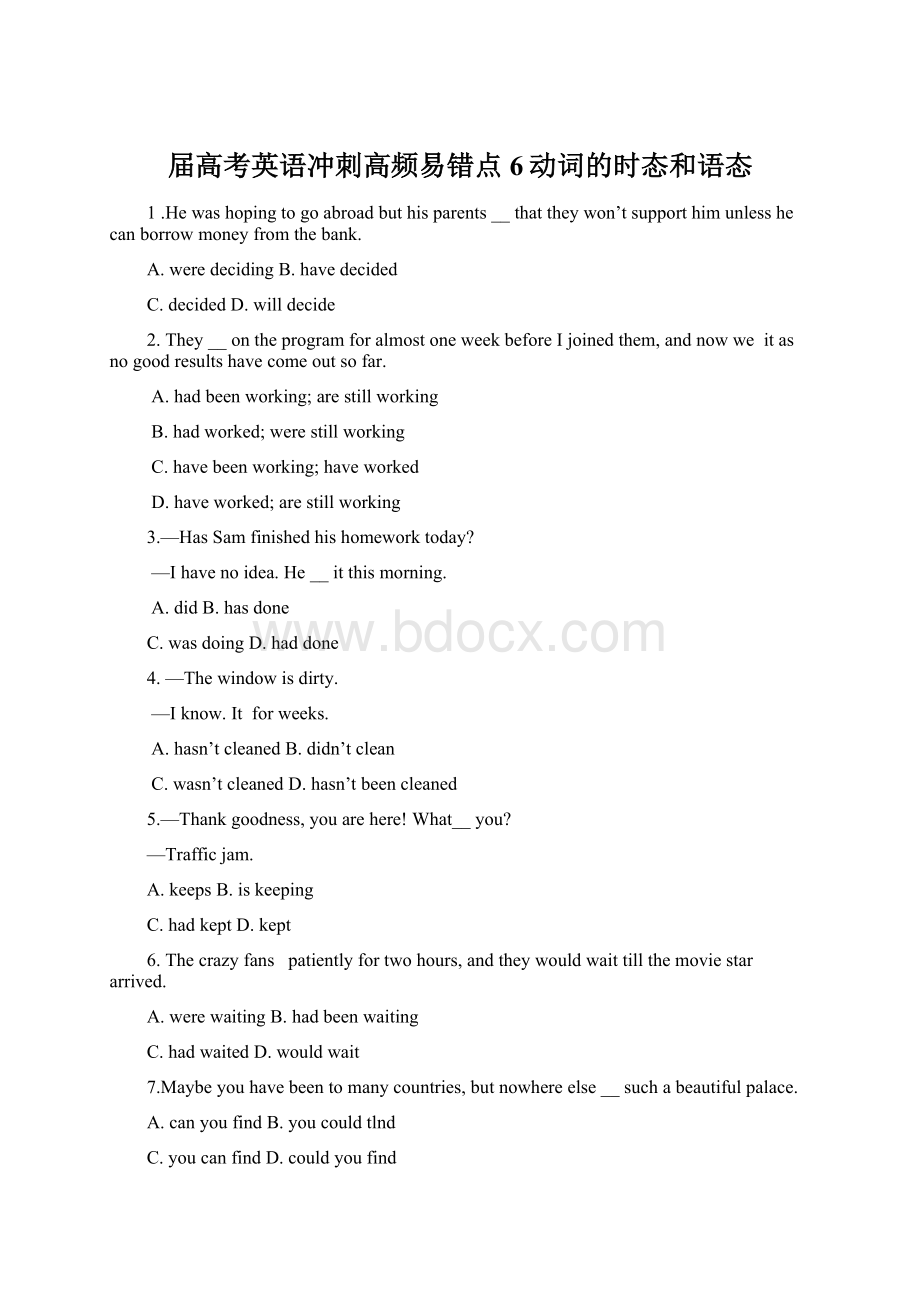届高考英语冲刺高频易错点6动词的时态和语态Word文件下载.docx
《届高考英语冲刺高频易错点6动词的时态和语态Word文件下载.docx》由会员分享,可在线阅读,更多相关《届高考英语冲刺高频易错点6动词的时态和语态Word文件下载.docx(15页珍藏版)》请在冰豆网上搜索。

A.keepsB.iskeeping
C.hadkeptD.kept
6.Thecrazyfanspatientlyfortwohours,andtheywouldwaittillthemoviestararrived.
A.werewaitingB.hadbeenwaiting
C.hadwaitedD.wouldwait
7.Maybeyouhavebeentomanycountries,butnowhereelse__suchabeautifulpalace.
A.canyoufindB.youcouldtlnd
C.youcanfindD.couldyoufind
8.Thenumberofdeathsfromheartdiseasewillbereducedgreatlyifpeopletoeatmorefruitandvegetables.
A.persuadeB.willpersuaded
C.bepersuadedD.arepersuaded
9.Millionsofpounds’worthofdamage_byastormwhichsweptacrossthenorthofEnglandlastnight.
A.hasbeencausedB.hadbeencaused
C.willbecausedD.willhavebeencaused
10.—Whydidyouleavethatposition?
—I__abetterpositionatIBM.
A.offerB.offered
C.amofferedD.wasoffered
11.Sarah,hurryup.I’mafraidyouwouldn’thavetimeto__beforetheparty.
A.getchangedB.getchange
C.getchangingD.gettochange
12.Accordingtotheartdealer,thepaintingtogoforatleastamilliondollars.
A.isexpectedB.expects
C.expectedD.isexpecting
13.ThemayorofBeijingsaysthatallconstructionworkfortheBeijingOlympics__by2007.
A.hasbeencompletedB.hascompleted
C.willhavebeencompletedD.willhavecompleted
14、Whentheoldman__towalkbacktohishouse,thesun__itselfbehindthemountain.
A.started;
hadalreadyhiddenB.hadstarted;
hadalreadyhidden
C.hadstarted;
washidingD.wasstarting;
hid
15.Scientiststhinkthatthecontinents__wherethey__today.
A.aren’t;
areB.aren’t;
were
C.weren’t;
areD.weren’t;
were
16.Let’skeeptothepointorwe__anydecisions.
A.willneverreachB.haveneverreached
C.neverreachD.neverreached
6.【错误解答】A、C、或D
【易错点点睛】题于意思为:
那些疯狂的影迷已经耐心地等了两个小时,而且他们会一直等到那位影星的出现谓语是针对过去某个时候而言一直持续的状态,故需要用过去完成进行时不是过去某个时候正在发生的动作(A)或即将发生的动作(D):
若选C,最好是不再继续等待。
【正确解答】B
13.【错误解答】D
【易错点点睛】题干中有明显的时间状语by2007,是一个将来的时间。
短语by+将来的时间和将来完成时连用,同时construction和complete是被动关系,故用将来完成时的被动语态形式。
【正确解答】C
易错起源1、常见的八种时态及其延伸时态的含义和基本用法
例1.Nowthatsheisoutofjob,Lucygoingbacktoschool,butshehasa’tdecidedyet.
A.hadconsideredB.hasbeenconsidering
C.consideredD.isgoingtoconsidered
1.一般现在时
有计划的动作常用来表示计划、安排好了的将来动作,如go,come,start,leave,takeoff(起飞),arrive,return等。
例如:
IleaveforBeijingnextMonday.
Themeetingbeginsinaminute.
在here,there,in等开头的倒装句中,一般现在时代替一般将来时。
Theregoesthebell.
Incametheteacher.
(3)表示感觉、状态、思想或理解的动词,如
see,hear,think,hope,wish,know,forget,understand,like,hate,mean,befeel,fit等常有可用于一般现在时。
Ifeelasuddenpaininmyhead.
2.一般过去时
在口语中,want,hope,wish,wonder,think等动词可用一般过去时表示现在的一种委婉的语气或一种试探性的态度;
情态动词的过去式could,should,would,might也可用于现在或将来时表示一种委婉语气。
Iwantedtoaskifyoucouldhelpme.
Couldyoulendmeyourdictionary?
Wouldyouliketohaveawalkinthegardenwithme?
WhatshouldIdonow?
3.一般将来时
(1)条件状语从句中,will可以用作情态动词,表示“意愿”。
Will还可以用作表示一种倾向或习惯动作。
Ifyouwillwaitforme,Ishallgowithyou.(表示意愿)
Cropswilldiewithoutwater.(表示倾向性)
Wherethereiswater,therewillbelife.(表示习惯性)
bedoing限于某些非延续性动词,如go,come,leave,start,finish等,表示按计划安排要发生的事。
Iamfinishingmyhomework.
Heiscoming.
TheyareleavingforTibet.
4.现在进行时
(1)用来表示现阶段正在进行的动作,尽管此刻这一动作不一定正在进行。
Howareyougettingalongwithyourworkthesedays?
(2)在时间、条件状语从句中,有时可用进行时来代替一般将来时。
Don’tmentionthiswhenyouaretalkingwiththemanager.
(3)现在进行时与always,allthetime,forever,constantly等词连用时,表示感叹、惊讶、厌恶等情绪。
Heisalwaysthinkingofhisstudy.(表示赞许)
Tomistalkinghispastallthetime.(表示厌恶)
(4)连系动词look,feel,smdl,taste,sound等,表示心理的动词want,like,prefer,have等一般不用于进行时态,也没有被动语态。
但是,turn,become,get,grow,go等表示由一种状态进入另一种状态时,用进行时。
Shefeelsworsetoday.
Thefishsmellsgood.
Therichmanisbecomingpoorerandpoorer.(改变状态)
It’sgettingdarkeranddarker.(改变状态)
5.—般过去时和现在完成时的区别
(1)一般过去时所表示的一个和一段过去时间是可以具体确定的,与其他时间没有牵连。
所表示的事情纯属过去,和现在的情况没有关系。
Whopointedoutthemistake?
Hewillneverbewhatheusedtobe.
Hewenttotownyesterday.(过去某次)
WhenIwasyoung,Itookbathregularly.(过去经常)
IwouldtellhimthegreatchangeswhenIwasinhishome.(经常发生的动作)
现在完成时表示的事情发生在不能具体指出的现在以前的过去某个或某段时间,所表示的事情与现在情况有关系,是过去事情在现在产生的结果或对现在的影响。
HaveyoueverbeentoShanghai?
Hehasgonetothelibrary.
(2)一般过去时常用的时间状语有yesterday,lastnight,twodaysago,atthattime等;
Atthattime,hewasverypoor.
Ifinishedmyhomeworktwodaysago.
现在完成时常用的状语,副词有already,just,yet,never,ever,before等,与表示从过去延续到现在并包括现在在内的一段时间状语连用,如today,now,lately,recently,inthelast/pastfewdays/weeks/years,sincethen,uptonow,sofar等。
Ihaveneverseensuchabigapple.
Hehasremembered500wordsthismonth.
Hehasbeenthereforfivemonths.
Ihaven’tseenhimsince典型例题Ihaven’tseenhimsinceheleft.
Iwon’tbelieveyouuntilIhaveseenitwithmyowneyes.
比较下面句子,体会两种时态的不同:
①Heservedinthearmyfrom1999to典型例题指过去的一件事,现在不是军人)
Hehasservedinthearmyfor6years.(现在还在服役)
②Hewrotemanynovelswhenhewasatcollege.(写许多小说是读大学时的事情)
Hehaswrittenmanynovels。
(写过许多小说,还在写)
③IsawWarandPeacelastyear.(去年看的)
IhaveseenWarandPeacebefore.(以前看过)
现在完成时和现在完成进行时的区别:
现在完成时的动作发生在过去,对现在有着影响;
现在完成进行时则强调延续或直接结果。
Youlooksotired,whathaveyoubeendoing?
Wehavebeendiscussingtheproblembutwehaven’tdrawnaconclusion.
易错起源2、主动语态、被动语态的含义和用法
例2.Whydon’tyouputthemeatinthefridge?
Itwillfreshforseveraldays.
A.bestayedB.stay
C.bestayingD.havestayed
【错误解答】A
【易错点点睛】一方面题干的意思说明“可以保留好几天”,是将来时态,一方面动词stay这里用作连系动词,不能用于被动语态,所以选B。
【正确解答】B
1.在口语和非正式场合下为了强调动作,常用“get+过去分词”结构。
有时带有不愉快、不顺利的含义。
其否定和疑问句要借助动词do来构成。
有时也会出现“become+过去分词”的结构。
Hegotwoundedinabattle.
Shegotmarriedlastweek.
Thepatientgetstreatedonceaweek.
Didyougetscoldedyesterday?
Hebecameseizedwithadeepsorrow.
2.短语动词和含有情态动词的被动语态形式短语动词的被动结构中,构成短语动词的介词或副词不能省略。
情态动词的被动语态形式是:
情态动词+be+过去分词。
Theoldwomanwasoftenlaughedat.
Thedoctorhasbeensentfor.
Timemustbemadegooduseof.
Theplanwillbegivenup.
Badhabitshavebeendoneawaywith.
Theplanoughttobeputintopracticeassoonaspossible.
3.主动形式表示被动意义的情况:
1)某些连系动词的主动形式表示被动意义,如look(看上去),smell,taste,sound,feel,appear(似乎),prove(证明),后面接形容词或名词做表语。
Therosessmellsweet.
Thetheoryprovedtrue.
Theexaminationturnedouteasy.
2)某些具有及物意义的不及物动词的主动形式表示被动意义,如read,write,translate,record,lock,shut,open,wash,clean,run,sell等,此时主语大多指物,并且一般和副词连用。
Yourcompositionreadswell.
Hisvoicerecordswell.
Thedoorlockseasily.
Thecoatwearswell.
3)表示开始、结束、运动的动词,如begin,finish,start,open,close,stop,end,shut,rna,move等。
例如
Workbeganat7o’clockthismorning.
Theshopclosesat6p.m.everyday.
4)少数动词用于进行时,主动形式表示被动含义,如print,build,cook,fly,hang,make等。
Thebooksareprinting.
Themeatiscooking.
Mycoatishangingbehindthedoor.
某些不及物动词(短语)的主动形式表示被动的意义。
常见的有:
happen,takeplace,breakout,belongto,goout,runout等。
Theaccidenthappenedyesterdayevening.
TheAnti-JapaneseWarbrokeoutin1937.
Thefirewentoutgradually.
Allofourfoodhasrunout.
易错起源3、情态动词+have+过去分词结构
例3.Thatwasreallyasplendidevening.It’syears__Ienjoyedmyselfsomuch.
A.whenB.thatC.beforeD.since
固定句式中的时态和语态的情况:
1.在if,unlless,evenif引导的条件状语从句中,在when,until(till),assoonss,themoment,once引导的时间状语从句中,nomaterwhat/who/which/when/where/how或whatever/whoever/whichever/whenever/wherever/however引导的让步状语从句中,如果主句是将来时(往往出现wilL/shall/can/must)或主句是祈使句,从句用一般现在时代替一般将来时。
I’llnotgounlessIaminvited..
Tellhimthenewsassoonashecomes.
2.“be+todo”表示拟订或计划中将发生的行为或按职责义务必须去做的事情;
“beabouttodo”表示即将发生的事,句中一般不使用时间状语。
Allthequestionsaretobeansweredatonce.(表示拟订的事情)
Nooneistoleavetheroomwithoutthepermissionofthepolice.(表示按职责必须做的事)
Theyareabouttoleavetonight.(错误,去掉tonight)
3.语境中的过去时,往往表示“刚才,刚刚”的意思,暗示现在已“不再这样”。
Idon’tknewyouwerehere.(说话时已经知道了你在这儿)
Ineverthoughthewoulddothat.(说话时已经知道了他会这样做)
4.表示愿望、打算一类的词,如hope,expect,mean,intend,want,think,suppose,want等,其过去完成时表示过去未曾实现的愿望或意图。
IhadhopedtoseemoreofNewYork.(实际上没能实现)
Ihadmeanttohelpyou,butIwastoobusyatthatmoment.(本来打算帮你,但没有实现)
Ihadthoughtthathewouldcometomorrow.(结果是他明天不能来)
三个特殊句式的固定时态。
(1)This/Itisthefirst/second...time+that从句。
从句中一般用现在完成时,前面的is为was时,则用过去完成时。
ThisthefirsrtimeIhavecometothefamouscity.
Itwastheforthtimehehadmadethesamemistake.
(2)Itis/hasbeen+一段时间+since从句。
since从句中一般用一般过去时,如果前面是was,则since从句中用过去完成时。
Itwastenyearssincewehadhadsuchawonderfultime.
(3)It+be+一段时间+before从句。
如果主句用将来时,从句用一般现在时表示将来,意思是多长时间后即将发生某事;
如果主句用过去时,从句也用过去时,意思是多长时间后发生了某事。
Itwon’tbelongbeforehesucceeds.(要不了多久他就会成功)
Itwastenyearsbeforetheymetagain.(十年后,他们又见面了)
1.Iwouldhaveattendedyourbirthdaypartylastnightbutforthefactthatit______atthattime.
A.wouldrainB.wasrainingC.hadrainedD.hadbeenraining
2.He’salreadygonehome.Butbeforeheleft.He_________allth